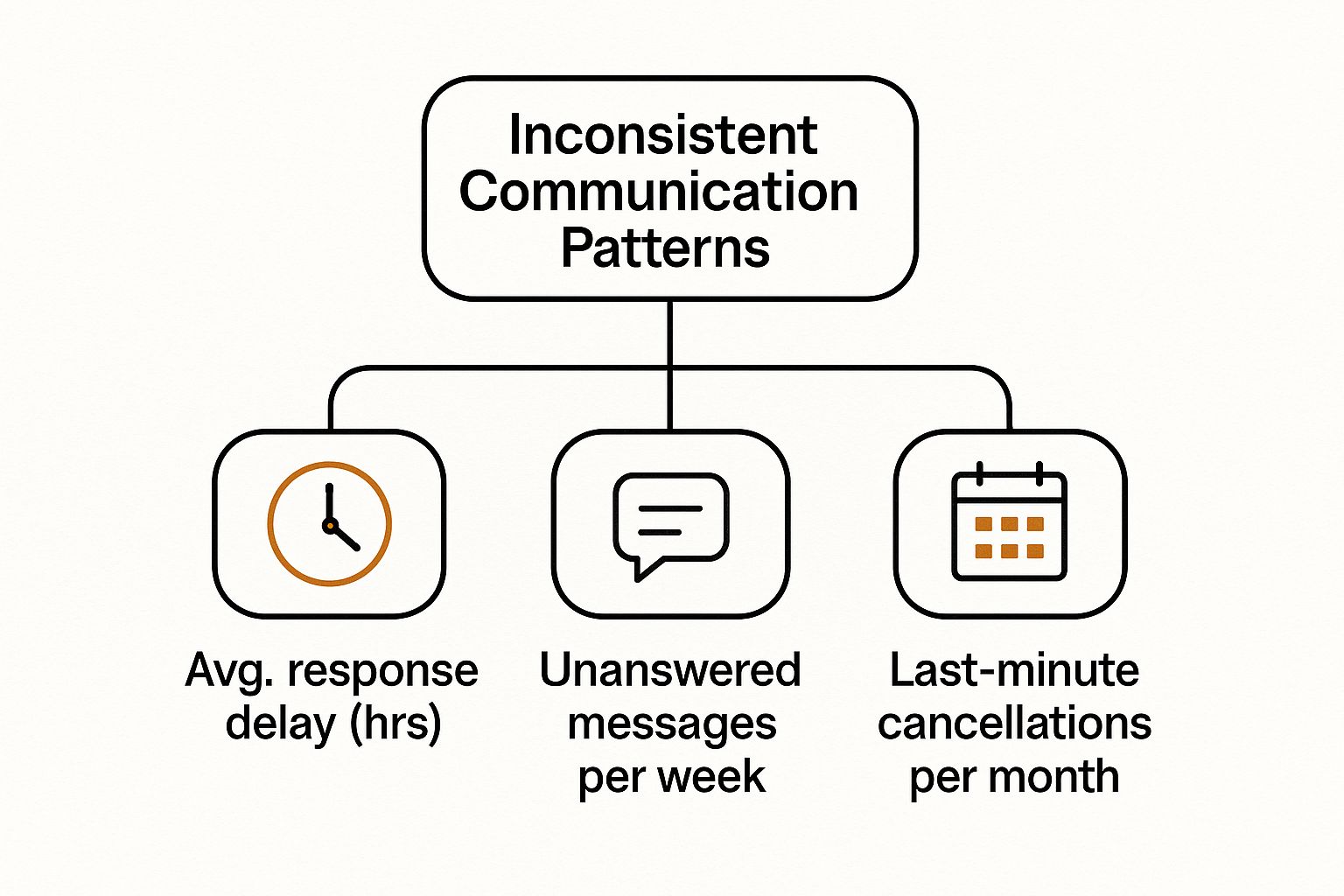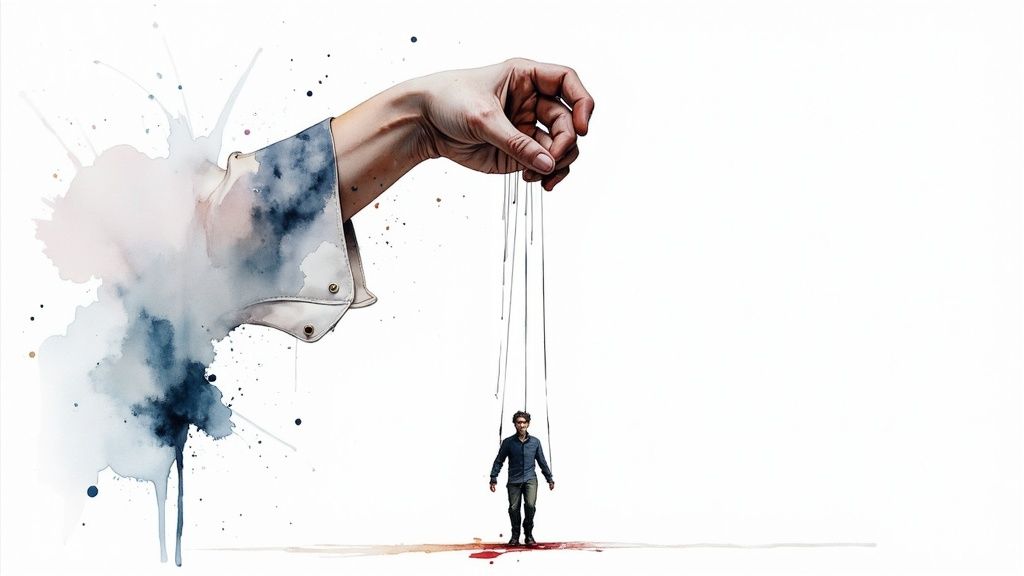Dating red flags are those gut-wrenching warning signs that hint at an unhealthy, manipulative, or even abusive dynamic down the road. They aren’t just little quirks or pet peeves; they are recurring behaviors or attitudes that point to much deeper issues with respect, trust, or emotional stability.
What Are Red Flags In Dating Actually
Think of red flags like the caution signs you see on a hiking trail. A small, simple sign might warn you about a slightly uneven path ahead—something you can handle with a little care. But a big, bright red sign screaming about a dangerous cliff edge? That’s your signal to turn back immediately for your own safety. In dating, these signs are crucial bits of intel about a potential partner's character and your long-term compatibility.
Spotting these signs isn’t about being nitpicky or overly critical. It’s about practicing smart, self-protective awareness. A red flag is a pattern, not a one-off mistake. Someone having a single bad day and being a bit grumpy is one thing. Someone who is consistently disrespectful, impatient, or controlling is something else entirely. The key is to watch how they behave over time.
A true red flag points to a fundamental incompatibility or an unhealthy dynamic that is unlikely to change. It’s an indicator that the person may not be capable of or interested in building the kind of healthy, respectful partnership you deserve.
Key Red Flag Categories to Watch For
To get a better handle on these warning signs, it helps to break them down into a few main categories. While we'll dive deep into each of these later, this quick guide gives you a solid overview of the most common types of dating red flags you're likely to come across.
Quick Guide to Dating Red Flag Categories
This table provides a high-level overview of the different types of dating red flags that will be discussed in this guide.
| Category | Core Issue | Example Sign |
|---|---|---|
| Emotional | Issues with emotional regulation, empathy, and respect for your feelings. | Love bombing, extreme jealousy, or gaslighting. |
| Behavioral | Problematic actions, habits, and patterns of conduct. | Disrespecting boundaries, a history of cheating, or inconsistency. |
| Financial | Irresponsibility, secrecy, or manipulation related to money. | Secretive about finances or expecting you to pay for everything. |
Each category reveals something important about a person's character and their ability to be a healthy partner. Now, let's unpack these a bit more.
- Emotional Red Flags: These revolve around how a person manages their own feelings and, just as importantly, how they treat yours. This bucket includes things like extreme jealousy, love bombing (showering you with over-the-top affection way too soon), and gaslighting, where they try to make you question your own sanity.
- Behavioral Red Flags: This category is all about actions and habits. It covers things like disrespecting your boundaries, being rude to service staff (a classic!), being wildly inconsistent with communication, or having a history of cheating. To see just how devastating these signs can be, some stories involve shocking revelations of infidelity.
- Financial Red Flags: How someone handles money can tell you a lot about their values and sense of responsibility. Major warning signs include being super secretive about their finances, having a spotty job history because of bad choices, or developing a habit of expecting you to cover all the bills.
The image below gives a great visual of how a common behavioral red flag—inconsistent communication—can be broken down into tangible patterns.

This shows that red flags aren't just vague feelings. They can often be measured through concrete data, like how often they cancel plans or how long they take to respond.
Why We Overlook Obvious Red Flags

It’s a classic, frustrating feeling. You look back at a relationship that’s ended and think, “How on earth did I miss that?” The truth is, even the smartest, most self-aware people can justify or completely ignore major red flags. This isn't some personal defect; it’s just how our brains are wired.
A huge part of this is something called confirmation bias. It's our brain’s natural reflex to hunt for proof that supports what we already believe. If you’re convinced you’ve met someone amazing, you’ll start unconsciously highlighting all their good qualities while dismissing anything that doesn't fit that perfect picture.
Think of it like falling in love with a car on the lot. You adore the color and the style, so you conveniently ignore that weird noise the engine is making. You're already sold on driving it home. In dating, this is how someone’s chronic lateness gets spun into “they’re just a super busy, important person” instead of what it might actually be: a clear sign of disrespect.
The Sunk Cost Trap
Another sneaky psychological trap is the sunk cost fallacy. This is the stubborn voice in our head that tells us we have to keep going with something simply because we’ve already poured so much time, emotion, or money into it. Quitting feels like admitting all that effort was for nothing.
It’s like spending a whole weekend assembling a complicated piece of furniture, only to realize you made a huge mistake back on step one. But instead of taking it apart, you push forward, hoping you can somehow salvage it. Why? Because the thought of those wasted hours is just too painful.
This is exactly how we end up in unhealthy relationships. We compromise on one small thing, then another, and another. Before we know it, we're putting up with huge issues we would have found absolutely unacceptable on the first date.
The longer we stay, the more "invested" we feel, making it psychologically harder to cut our losses. This emotional investment creates a powerful incentive to ignore even the most glaring red flags, hoping things will eventually get better.
When Red Flags Hide in Plain Sight
Sometimes, the warning signs aren't just about your partner's behavior toward you. They can create ripple effects that bleed into other parts of your life, like your job, friendships, or hobbies.
For instance, one study on dating violence found that people in toxic relationships often start showing signs of distress that have nothing to do with the relationship on the surface. They might suddenly pull away from friends, lose passion for their interests, or even see their performance at work or school nosedive as they pour all their energy into coping with their partner. You can read more about these multifaceted warning signs and how they manifest.
Simply knowing these mental shortcuts exist is the first real step toward breaking the cycle. It’s not about beating yourself up for what you missed in the past. It’s about arming yourself with awareness so you can make healthier, more self-protective choices from now on.
Spotting Major Communication Red Flags
Solid communication is the glue that holds a healthy relationship together. But what happens when that glue becomes toxic? Sometimes, communication isn't just about arguments or misunderstandings—it can be used as a weapon. Certain patterns aren't just bad habits; they're huge dating red flags that flash a warning sign of serious trouble ahead.
Think about it like this: a good conversation is a lot like a game of catch. You and your partner toss ideas and feelings back and forth with mutual respect. A manipulative conversation, on the other hand, is more like a one-sided game of dodgeball. You’re left constantly ducking to avoid getting hit.
It’s one thing for a partner to have an off day or a moment of poor communication. That’s just human. It’s another thing entirely when it becomes a consistent, draining pattern. That's a warning you can't afford to ignore.
The Overwhelming Onslaught of Love Bombing
Love bombing is probably one of the most confusing red flags because, at first, it feels absolutely incredible. It’s a sudden, intense flood of affection, non-stop compliments, and grand gestures that kicks in way too early in the relationship. They might drop an "I've never felt this way about anyone" or start planning a two-week vacation with you after only a handful of dates.
On the surface, it looks like a whirlwind romance. But underneath, it's often a play for control. By drowning you in attention, a love bomber makes you feel unbelievably special—and a little indebted to them. This forges a quick, powerful bond, but it's one built on a fragile illusion.
- The Trap: They're not falling for you. They're falling for an idea of you, because let's be real, they don't actually know you yet.
- The Goal: Once they feel like they've "got" you, that firehose of affection can suddenly shut off. It might be replaced with controlling behavior or disappear completely, leaving you stunned, confused, and desperate to get those "good times" back.
If someone's intensity feels way too good to be true, it almost always is. Real connections are built brick by brick over time, not manufactured in a weekend.
The Silent Treatment as a Weapon
Another destructive pattern is stonewalling, which is when a person completely shuts down and refuses to communicate during a disagreement. They won't talk, won't make eye contact, won't engage at all. This isn't just taking five minutes to cool off; it’s using silence as a form of punishment.
When someone stonewalls you, they're seizing control of the situation. They unilaterally end the conversation, leaving you feeling powerless and ensuring the issue never gets resolved. It's a tactic that sends a brutal message: your feelings don't matter enough to even be discussed.
Stonewalling is so much more than just avoiding a fight. It's a power move that communicates contempt. It invalidates your entire perspective and creates an emotional climate where one person holds all the cards.
The Reality-Bending Tactic of Gaslighting
Gaslighting is an especially insidious form of manipulation where a partner methodically makes you doubt your own memory, perception, and even your sanity. They twist the truth with such confidence that you start to feel like you're the one who's crazy, over-sensitive, or just plain wrong.
For example, you might bring up something genuinely hurtful they said, only to be met with replies like:
- "That literally never happened. You're making things up again."
- "You're being way too sensitive. It was obviously a joke."
- "See? You're always trying to start a fight over nothing."
Over time, gaslighting can completely demolish your self-confidence and make you second-guess everything. It's a hallmark of emotional abuse and one of the most serious communication red flags. Recognizing these patterns for what they are—tools of manipulation—is the first and most critical step toward protecting yourself.
Financial Red Flags You Cannot Afford to Miss

Let’s be honest, talking about money can feel awkward, especially in a new relationship. But how someone handles their finances says a lot about their character, their sense of responsibility, and ultimately, their respect for you. Ignoring these signals can lead to a world of instability and resentment down the line. These aren't just minor differences in spending habits; they are major red flags that can completely unravel a relationship.
Picture this: you’re on your third date, the bill arrives, and suddenly your date gets an “urgent work call,” leaving you to foot the bill. Again. A one-off event might be an honest mistake, but when it becomes a pattern, that’s a red flag waving right at your wallet.
This kind of scenario is more common than you’d think, and it’s often a symptom of a much larger issue. In fact, a recent study showed that 52% of Brits have turned a blind eye to financial red flags from a partner. The problem is even more pronounced among younger daters, with a staggering 71% of Gen Z admitting they’ve missed these crucial warning signs.
The Secretive Spender and The Financial Controller
When it comes to financial red flags, two particularly concerning types often emerge: the Secretive Spender and the Financial Controller. Each one presents a unique threat to a healthy partnership, pointing to deep-seated issues that go way beyond just money.
The Secretive Spender is a closed book about their financial life. They might be cagey about their job, dodge any questions about debt, or get defensive if you bring up their spending habits. This secrecy is almost always hiding something—instability, poor decision-making, or a fundamental lack of trust.
On the flip side, you have the Financial Controller, who tries to exert power over your money. They might constantly criticize your purchases, demand to see your bank statements, or insist on managing all the household finances. Make no mistake, this isn't about responsible budgeting; it’s a control tactic designed to create dependency and strip you of your autonomy.
A partner’s financial behavior is a window straight into their core values. Secrecy, control, and consistent irresponsibility aren't just money problems—they are relationship-destroying patterns that signal a lack of respect and readiness for a real partnership.
Common Financial Warning Signs to Spot
The key is to recognize these issues early, before you’re too emotionally invested. Many people, especially those dating online, don't see the signs until it's too late. Keep an eye out for these patterns:
- Consistently "Forgetting" Their Wallet: They seem to have a recurring case of amnesia whenever a bill appears, leaving you to cover shared expenses time and again.
- Vague or Evasive Financial Conversations: They're masters of changing the subject when any talk about income, debt, or financial goals comes up.
- A History of Financial Instability: You notice a pattern of unstable jobs, constant borrowing from friends or family, or bad credit that they always blame on someone else.
- Pressure to Make Major Financial Decisions Quickly: They might push for a joint bank account, a co-signed loan, or a large purchase way too early in the relationship.
Spotting these issues is the first step. For more on similar warning signs you might encounter in the digital world, check out our guide on online dating red flags. Once you know what to look for, it helps to understand what healthy financial dynamics look like. For great insights on building a strong financial future together, you might want to explore some effective money management strategies for couples.
How Core Values and Lifestyle Clashes Become Red Flags
While things like communication styles or spending habits are pretty visible signs of compatibility, some of the deepest red flags come from a more fundamental place: a clash in core values and lifestyle.
Think of your core values as your personal operating system. They quietly run in the background, guiding your big decisions, shaping your view of the world, and defining your personal sense of right and wrong.
When you’re with someone whose "operating system" is totally incompatible with yours, you're just setting yourself up for constant system errors. A shared love for tacos can't bridge a chasm between opposing views on family, integrity, or how people should be treated. These aren't just minor disagreements—they're warnings of future conflict and a whole lot of unhappiness.
When Beliefs Become Deal-Breakers
In today's dating scene, political and social beliefs aren't just background noise anymore. For a lot of people, especially younger daters, they're front and center.
A recent poll of 1,033 adults aged 18-34 showed that political affiliation is a huge factor in who they'll date. For example, a staggering 76% of young women said dating a vocal MAGA supporter was a major red flag. You can read more about these generational dating trends to get a feel for how much beliefs are shaping modern romance.
And it’s not just about politics. That same poll uncovered other lifestyle clashes that people see as serious warning signs:
- 66% of women see a man having no hobbies as a red flag.
- 60% are turned off by someone who says “All Lives Matter.”
- 53% consider a man's refusal to see the 'Barbie' movie a red flag.
These examples really highlight how something that seems like a simple preference—like a movie choice—can signal a much deeper misalignment in values that many just aren't willing to compromise on.
A partner doesn’t need to be your clone, but a severe clash in your fundamental beliefs about how the world should work is a serious red flag. It points to a future where you may constantly have to defend or compromise your core identity.
Sometimes, when a partner senses their values don't line up with yours, they might become distant or inconsistent. If you've noticed someone pulling back right after a conversation about your beliefs, it could be a direct result of this clash. For a closer look at this behavior, our guide on why do men pull away can offer some valuable insights.
Ultimately, getting clear on your own core values gives you the confidence to find a partner whose principles don’t just coexist with yours—they actually complement them.
What to Do When You Spot a Red Flag

Seeing a red flag is one thing, but knowing what to do next is where you really take back your power. Your reaction doesn't always have to be a dramatic breakup on the spot. It's all about figuring out how serious the issue is and learning how to talk about it.
First, let's draw a line between a "yellow flag" and a true "red flag." A yellow flag is something that gives you pause but might just be a fixable quirk, like a bad habit of interrupting. A red flag, on the other hand, hints at much deeper problems like disrespect or a need for control. Those are the ones that signal it might be time to walk away.
When a concern comes up, how you bring it up changes everything. Instead of pointing fingers with something like, "You never listen," which just makes people defensive, frame it from your perspective. Try using "I feel" statements. For example: "I feel unheard when I'm trying to share something important, and the conversation moves on so fast." This makes it about your experience, not their character flaws.
Assess Their Reaction
The way your partner responds when you voice a concern tells you almost everything you need to know. A healthy partner will get curious and try to understand where you're coming from, even if they don't agree at first. An unhealthy one will get defensive, dismissive, or even flip the script on you.
Pay close attention to how they respond:
- Openness: Do they ask questions to understand your feelings better?
- Defensiveness: Do they immediately make excuses or deny it happened?
- Blame-Shifting: Do they accuse you of being "too sensitive" or claim you caused the problem?
A defensive reaction is a massive red flag all on its own. It shows a complete inability to take responsibility, which is a non-negotiable for any mature relationship. Breaches of trust, for instance, demand serious accountability. If you’re dealing with this, learning how to rebuild trust after betrayal can show you what genuine remorse and a commitment to change actually look like.
If the red flags point to emotional or psychological danger—like intense jealousy, controlling behavior, or gaslighting—your safety has to be the #1 priority. Your goal is no longer to fix the relationship; it's to get out of it safely.
This is when you need to lean on your support system. Talk to trusted friends or family who can give you a reality check and keep you grounded. Sometimes, the bravest thing you can do is walk away from a situation that's chipping away at your well-being.
Still Have Questions About Red Flags?
It’s one thing to read about red flags, but it’s another to know what to do with them in the real world. Let's tackle some of the most common questions that pop up when you're trying to navigate the messy, confusing, and wonderful world of dating.
Red Flag vs. Human Flaw: What's the Real Difference?
This is a big one. It's easy to get caught up in looking for problems and start labeling every little imperfection as a red flag. But there’s a crucial difference between a simple flaw and a genuine warning sign.
A flaw is just part of being human. Maybe they’re a terrible cook, chronically messy, or snort when they laugh. These are quirks, not character defects. A red flag, on the other hand, is a pattern of behavior that signals a deeper issue with respect, trust, or emotional safety. Think consistent disrespect, controlling tendencies, or a total lack of empathy—these aren't just flaws; they're foundational problems.
How Can I Help a Friend in a Bad Situation?
Watching a friend ignore major red flags in their relationship is agonizing. Your first instinct might be to shout, "You need to break up with them!" But that approach almost always backfires.
Instead of criticizing their partner, focus on your friend. Express your concern from a place of love. Try something gentle like, "I've noticed you seem a bit down lately, and I just want you to know I'm here if you ever want to talk." This opens the door for conversation without putting them on the defensive. Your job isn't to force them out, but to be a safe harbor they can turn to.
The most powerful thing you can do for a friend is to listen without judgment, validate their feelings, and gently remind them of their worth. Reinforce that they deserve to be happy and respected.
How Do I Spot Red Flags Without Becoming Cynical?
It’s a fine line to walk. You want to be smart and protect yourself, but you don’t want to become so jaded that you can't enjoy the process of getting to know someone. The key is to shift your focus from flaw-hunting to alignment.
Instead of actively searching for what's wrong, simply observe. Do their core values and actions line up with the kind of healthy, respectful partnership you truly want? It’s less about a checklist of negatives and more about a feeling of compatibility. At the end of the day, you have to trust your gut—it's your most reliable guide.
At Poke Match, we provide expert advice to help you build healthier connections. For more insights on relationships and personal growth, explore our resources at https://poke-match.com.
